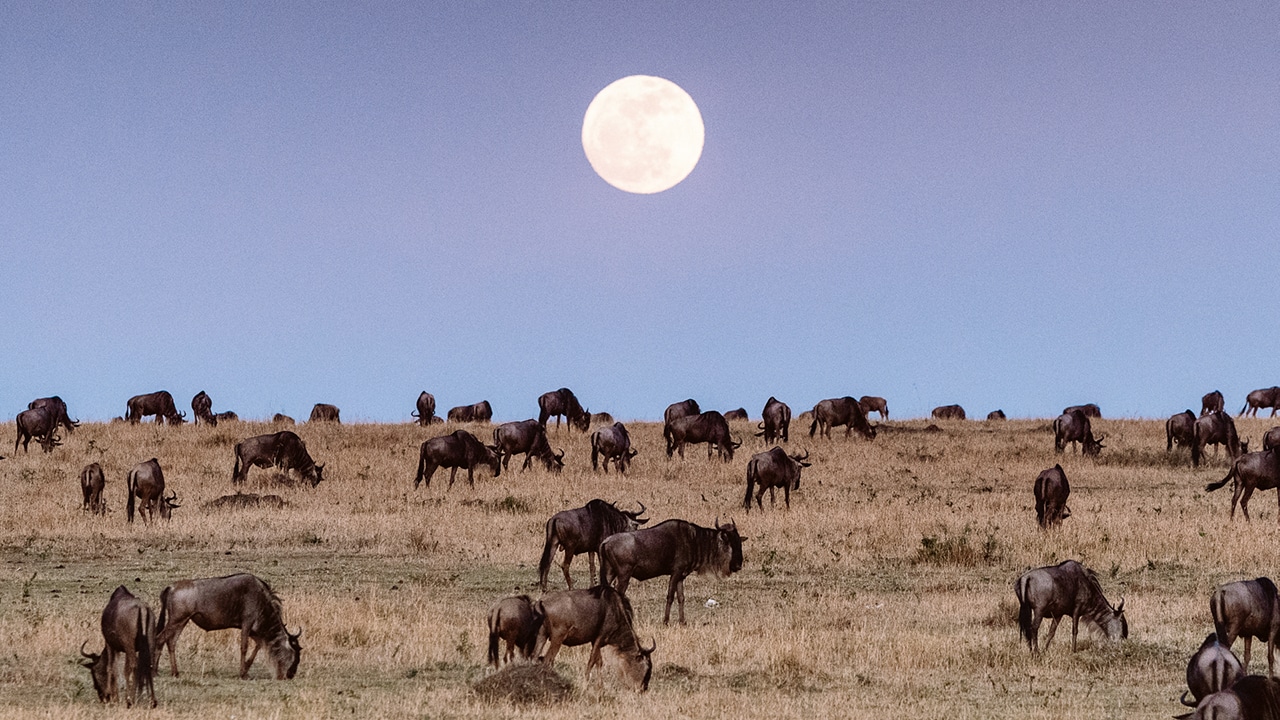
The proximity to wildlife, like the Great Wildebeest Migration, fosters a sense of preservationism in visitors. Photo: Chris Howe]
Travel companies in Tanzania are pushing local outreach, ecological design, and conservation to give luxury a purpose.
A Maasai chief has welcomed me into his Boma, a 150-square-foot temporary home, carefully constructed for him by one of his six wives. The home has been built from materials local to the Ngorongoro Conservation Area, a 3,000-square-mile World Heritage Site in Tanzania that the Maasai, a semi-nomadic people, have walked for more than 200 years. I have to duck to enter, the only light entering from a circular vent in the roof made of cow dung and dry grass. I’m traveling with Joseph, a local guide provided by our hotel group, &Beyond. Joseph happens to also be part Maasai and speaks their native Maa language, along with five others, perfectly. However, his real ability to translate relies more on a deep understanding of both of our cultures than the language itself.
“Please, ask away. The Maasai chief wants you to know he is very open and here to share,” Joseph tells me. I sit at the edge of a small earthen bed and unleash a flurry of (increasingly personal) questions. Joseph navigates the conversation with ease. My mind is racing as I speak with the chief. He is, after all, one of the few people I’ve met truly living off the land, as sustainably as one could imagine. He is also the first polygamist I’ve ever interviewed. Our topics of conversation start with the practical—housing, food, water, clothing, and medicine—then transition into love, family, sex, wives, and the challenges of leading a tribe increasingly threatened by modernization and development. I ask about the plastic bottles of banana liqueur, wrist watches, and cell phones I spotted on the way in. The conversation ends up being one of the most fascinating I’ve ever had. It’s an experience I’ll surely remember, and one that has led me to question so many beliefs.
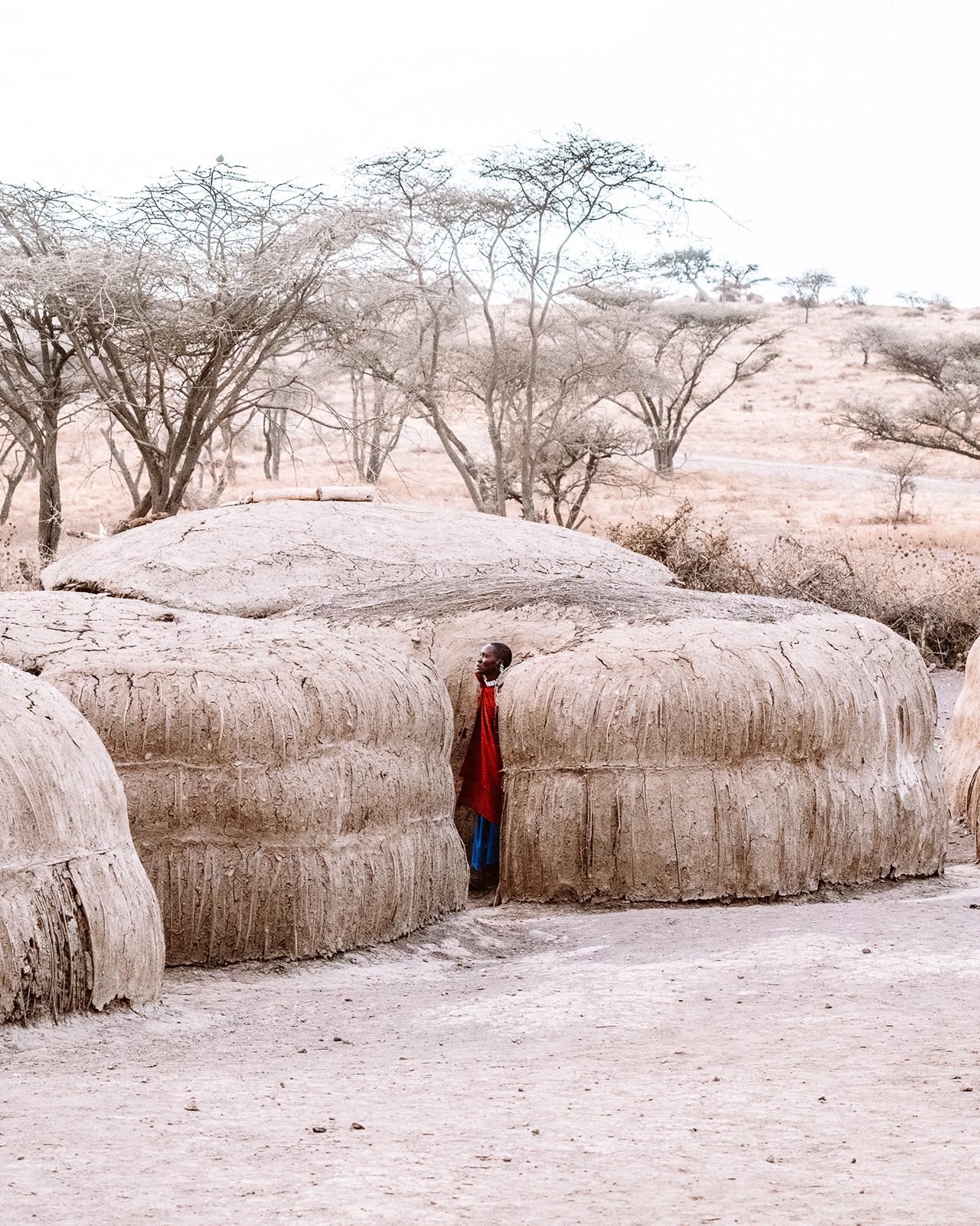
Huts are built by women of the tribe from sticks, mud, and cow dung. [Photo: Chris Howe]
This experience, this firsthand, mind-opening, and belief-challenging encounter, is exactly what fuels hospitality organizations like &Beyond, who brilliantly deliver a mix of amenity and integrity. “Overall, we’re seeing less focus on crystal chandelier-type luxury. Experience is the new luxury,” says Joss Kent, CEO of &Beyond. And in that respect, he adds, the impulse is not to escape life, but enrich it.
Later that night, back at &Beyond’s Ngorongoro Crater Lodge, I walk the grounds, comprised of 30 stilted suites with banana leaf ceilings and grass roofs. The buildings incorporate Maasai methods of handcrafted mud and thatch, taking inspiration from manyatta homesteads, and count African antiques and figures among their furnishings. Comforts like a domed dining room and fireplace cultivate serious luxury while maintaining a proper sense of place. As I explore, I’m amazed at how contagious the staff’s enthusiasm for conservation is, from the hotel managers to the groundskeepers. As I chat with a landscaper about the local trees, we pause to watch a dazzle of zebras stroll by. He continues to chatter along, but I’m floored by the proximity. “Until a guest comes on safari with us and sees a rhino in the bush just a few feet from them, it might be hard for them to identify with the cause,” Koss says. “But after that experience, they undoubtedly do; they get it.”
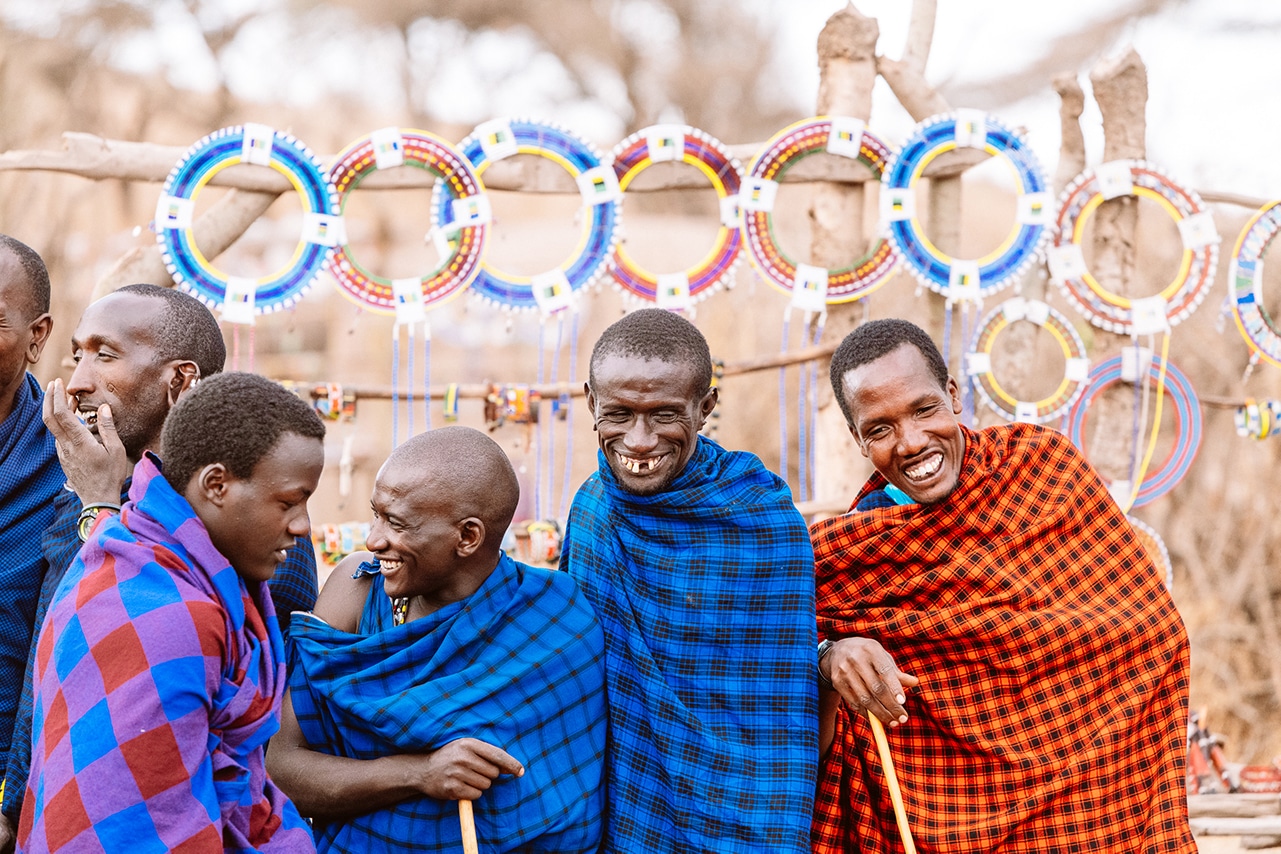
Maasai warriors celebrate after performing “adumu,” a traditional jumping dance. [Photo: Chris Howe]
The sustainability initiatives that &Beyond spearheads—a breeding program of Aders’s duikers antelopes on an island off the coast of Tanzania, local reforestation efforts like the 60,000-plus trees planted by a team at the Ngorongoro Crater Lodge—really hit home after experiences like that. &Beyond also works alongside Africa Foundation, a nonprofit that provides clean water to communities and helps empower small businesses for people who live in rural areas near conservation sites. &Beyond has also bought and revitalized thousands of hectares of previously degraded land, led the safe reintroduction of cheetahs and lions, relocated 100 rhinos from South Africa to Botswana to secure them from poachers, and worked with landowners to grow the population of the endangered black rhino. Every business decision is gauged along three key criteria: care of land, wildlife, and people.
Just before sunrise Joseph drives me down into the Ngorongoro Crater for a chance to see the extremely rare black rhino. We spend the day spotting elephants, lions, giraffes, hippos, hyenas, and buffalo and chatting about the locals and the complicated, yet serious, efforts that go into conserving the area. The park has strict rules against not only damaging plant life and littering, but also excessive noise and even driving faster than 30 miles per hour. As the sun begins to lower, we decide to turn back to camp, our search for the rare rhino unsuccessful. Then, just before the last turn to exit the park, we spot it—a five-foot-tall, 3,000-pound black rhino. There are fewer than 30 left in the park, and we spend close to an hour watching it from a distance.
FROM OUR JAN+FEB 2019 ISSUE
The preferred publication of leading green professionals.
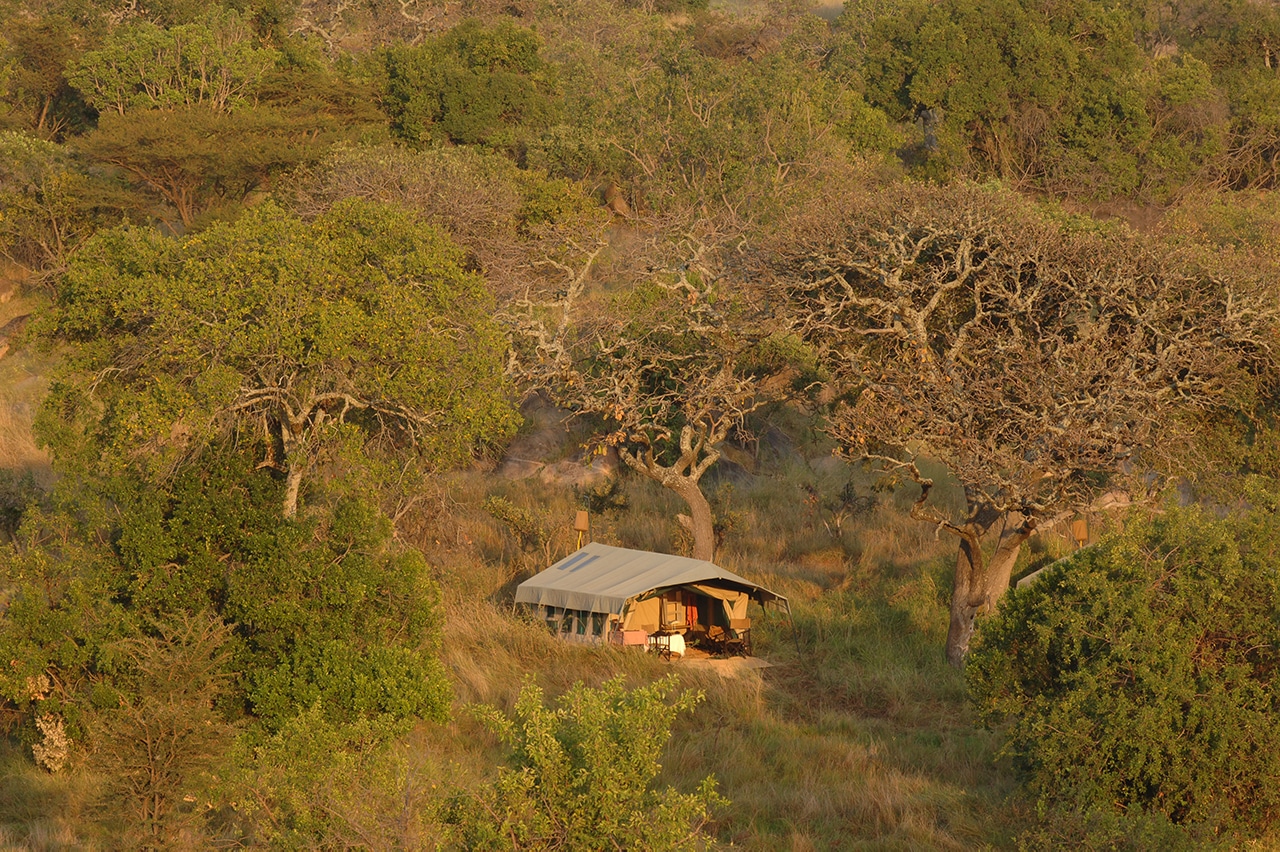
Nomad’s Serengeti Safari Camp [Photo: Courtesy of Nomad Tanzania]
The next day I head off to the the border of Tanzania and Kenya to witness the Great Serengeti Wildebeest Migration, the annual trek taken by massive herds of wildebeest, antelopes, and zebras across northern Tanzania in search of fresh grasslands. When I arrive I’m met by the guides from Nomad Tanzania, who bring me to the Serengeti Safari Camp. The mobile tent camp encompasses seven open-plan eco-conscious Meru tents. You can sip a cocktail and lounge fireside in the patio pit and dine family-style under a communal tent; it’s the perfect view of the borderline life-changing scene of a million wildebeest mooing and crossing. At night, there are so many animals that, if you walk, you have to go with a guard to keep lookout. Bathrooms sport flushable, low-water eco-toilets; and you bathe in safari-style bucket showers.
It all gets me thinking about my own habits of consumption, and I’m relieved to discover how much Nomad considers theirs. The camps are nearly 100% free of single-use plastic, and they work with villages near the Serengeti National Parks to help them eliminate plastic waste, too. “We want to work with our environment, not against it, and to engage local communities near our camps to join forces with us in correct waste management,” says Tara Walraven, marketing manager of Nomad Tanzania.
Guests can also get involved with The Nomad Trust, an in-house nonprofit that provides access to education and health care for locals who, due to the site’s remoteness, otherwise have difficulty. They stock classrooms with school supplies, sponsor scholarships for students, and fund early-education nursery centers. (All profits from massage treatments and shops at the camps also directly fund the Trust.) Nomad is also committed to hiring locally, employing dozens of guides and camp managers, and their Biashara initiative (Swahili for “business”) offers micro-financing for workers, internship and training opportunities for photographers, and pathways for back-of-house staff to graduate to high-level guide positions. And, of course, the cornerstone of everything is sustainability. “As a company founded on and grounded in its love of wilderness, we are conservators by nature, fully committed to treading lightly on our environment,” Walraven says.
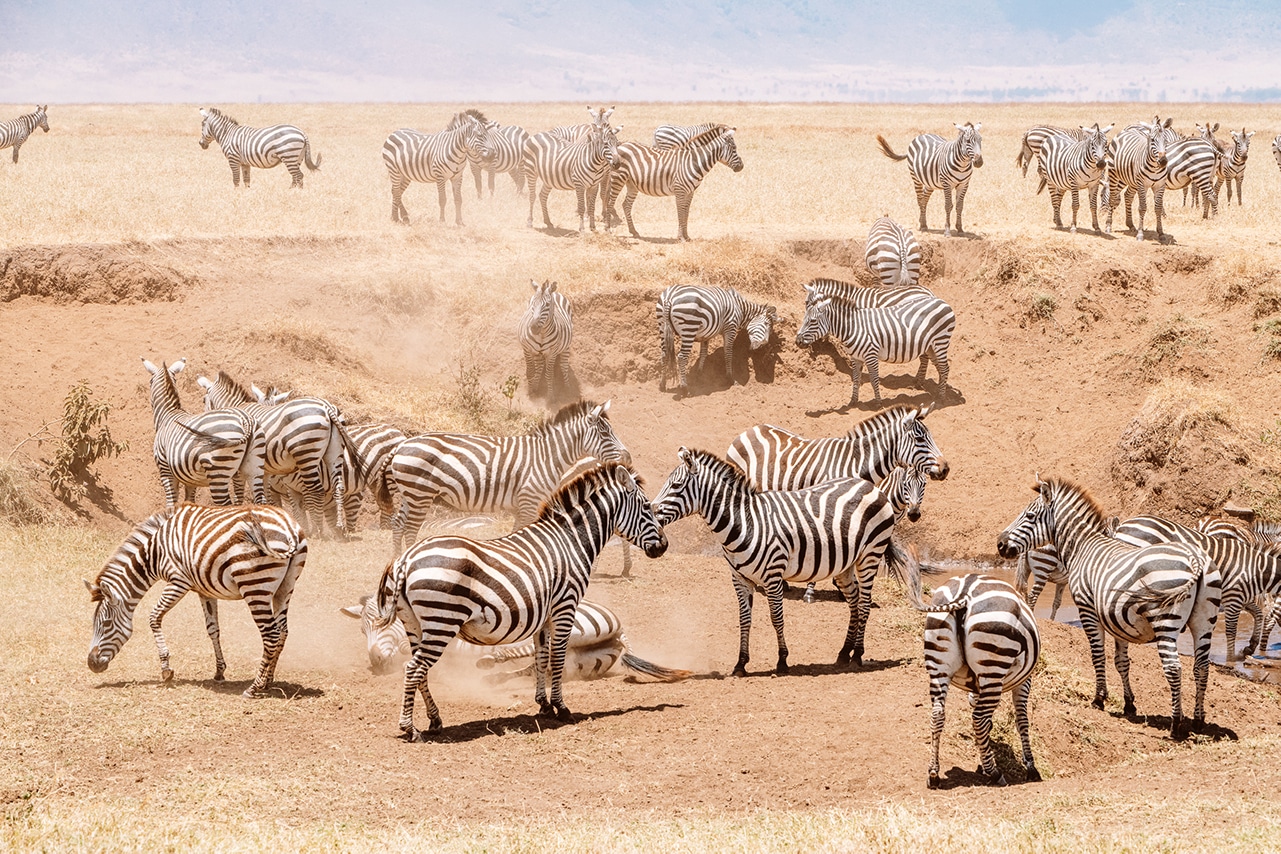
A dazzle of zebras dust-bathe in the Serengeti. It’s estimated that up to 250,000 zebra participate in the Great Migration. [Photo: Chris Howe]
My final stop brings me to the Four Seasons, where I’m happy to learn that commitment to environmental and civic stewardship runs deep even at legacy hospitality brands in Tanzania. With a high-tech waste water system, solar panels, and on-site bottling plant, the hotel has won awards for resource efficiency and garnered nods for community support and female employment efforts. The hotel employs Maasai people in positions ranging from guest services to security to staffing its Discovery Centre, where visitors can bone up on the local history, customs, and flora and fauna. “Being privileged to enjoy a location in the heart of the Serengeti, it is our aim to engage the Lodge—guests and employees—in environmentally, socially, and economically sustainable practices that conserve natural resources, reduce the Lodge’s environmental impact, and help protect the Serengeti National Park and the communities within and surrounding it,” says Martin Cody, general manager of Four Seasons in Tanzania.
Four Seasons also finances community projects from directly game-drive and safari-walk funds; supports several wildlife conservation efforts, including big cat and wild dog rescue; donates thousands of dollars annually to de-snaring and anti-poaching initiatives; and the boutique sells jewelry and accessories made by Maasai women from Arusha, the third largest city in Tanzania and the town in which the hotel focuses the majority of its outreach efforts.
Additional reporting by Stephen Gossett

